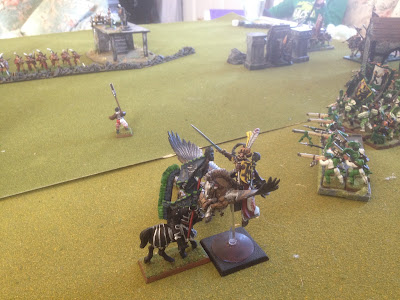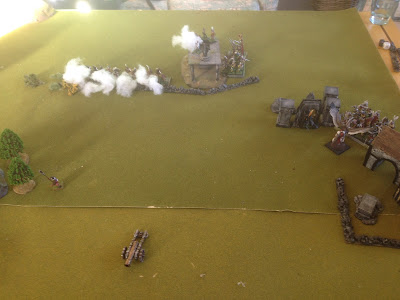Having decisively beaten Pietr and the Grand Army of Hardenburg at the Battle of Grenzsdadt, forcing them into retreat, and with Kastor now advancing on Pfungzig in the wake of Vyshnevtksy's defeat on the Bieswang road, Ferdinand now pushed north, pursuing the fleeing Grand Army. Sending his fastest troops after them, he lead them himself, mounted upon his own flying steed.
The rearguard of the Hardenburg Grand Army, a large contingent of infantry from the Kasotian Republic, one of the only contingents to leave Grenzsdadt in good order, now made a stand in the foot hills, turning to face the on coming vanguard.
As it was Ferdinand's vanguard chasing them the Hardenburgers had more points, but could not pursue or move over the halfway point on the board, and had their leadership reduced by 1 point, also being unable to use their general or parent unit's leadership.
Ferdinand's army: (1500pts)
Ferdinand Leitdorf - General of the empire on Pegasus
captain
wizard Lord - lore of life
6 knight's of the blazing sun inner circle knights
3rd Loepold's own-20 halberds
count's guard-17 greatswords
25 Tilean hand gunners
great cannon
The chuffnought-steam tank!
Grand army of Hardenburg: (2000pts)
Lord High Justice - Wizard lord - lore of metel
Chaplain of the Black Bear knights - wizard - lore of metel
Captain Marlow - Battle standard bearer
35 Kasotian halberdiers with 2 detachments of 15 Kasotian handgunners
great cannon
great cannon
5 knights
35 greatswords with 2 detachments, 10 handgunners and 15 free companies
The rural countryside consisted of a hill of skulls, two mysterious woods, a wall, two buildings (one with a altar of Kain, all units with in 6" have frenzy) and a sigmarite shrine (yar boo sucks to Morr!)
The Hardenburg lines form up.
The woods in front of the Averlanders were very much feared to be a wild wood or something, so the steam tank rolled though it smashing every tree down before it!
How ever this was not the best move for the steam tank as it was promptly hit by a great cannon, sending bits of metal flying about!
The tank engineer seeing he was going to get blasted apart by guns and (no it was not a lore of death Wizard so no roses) magic, swivelled round and sent a shot right though the Wizaed lord, putting him out of the battle.
The engineer's fears were right and the tank was blown apart by the next volley from the Hardenburg guns.
The Kasotians, encouraged by the steam tank being out of action advance.
But while the Hardenburgers had focused all their time and attention on the tank Ferdinand, leading the knights and the 3rd halberds up on the left, flew over the building and fell on a cannon, killing all its crew! He then flew into the free company detachment, destroying them as well for good measure.
With the halberds and the knights in a neat line the Averland cannon shot, just at the right time, blasting though a rank of infantry and killing all but one of the knights!
The remaining Hardenburg cannon had misfired and was unable to stop Ferdinand charging into the other Wizard. Then Ferdinand's hand gunners fired! they scattered the Kasotians, all of them fleeing the battle! Their detachment panicked and fled as well. Ferdinand, having finished carving up the Wizard, flew straight into their flank, scattering them!
The Hand gunners on the left killed a few great swords, bit failed to make them panic. While the others on the right did't kill anything. Then the great cannon fired on Ferdinand! but over shot, missing him!
The greatswords the whole time had been moving up, a walking line of steel. When the last wizard on the field, with a gesture of his staff blew the doors of the shrine open. All forty great swords looked at him. With a thundering voice he uttered a fearful spell!
The great sword waited, nothing happened, they began to laugh, when a low rumbling below them made them pause. the earth opened and three huge hairy monsters, a hand and some tentacles leapt out and started hauling screaming men below!
Then as quickly as they had come the creatures jumped back into the earth, the ground sealing up behind them. Over half of the regiment had been killed!
The last hardenburg cannon was put out of action by Ferdinand.
The last knight of the black bears on the field faced the fearsome Ferdinand.
The great swords took a hammering from the cannon.
But they then charged into the knights of the blazing sun beating them and running them down and then pushing into Leopold's own!
But help was on the way as Ferdinand on flying steed crashed into their rear!
The great swords then turned and hauled ferdinand from his steed wounding him. But it was too late for hardenburg, the greatswords were all hacked to the ground by the halberds while the Tilean gunners, like the crack shots they were, blew the last regiment from the battle.
A clear victory for Averland!
Ferdinand had once again proved himself to be a great general and warrior, himself killing two cannons, a wizard, a detachment of free companies and a unit of hand gunners! though this was the first action when he was wounded...
Pietr and the Grand Army would now be again forced north towards the Blue Reach. They would be aiming to find shelter in Pfungzig... however with Kastor Leitdorf ready to attack Vyshnevtsky and the marines in the town there was no certainty of retreat that way. Pfungzig fall and Vyshnevtsky be thrown back over the Blue Reach into Stirland, the Pietr and the Grand Army would find there own retreat across the barren country of Eastern Averland much harder as they conducted a fighting retreat to the Blue Reach. It seemed then that the fate of Hardenburg's campaign rested upon the defence of Pfungzig...
by M
























































